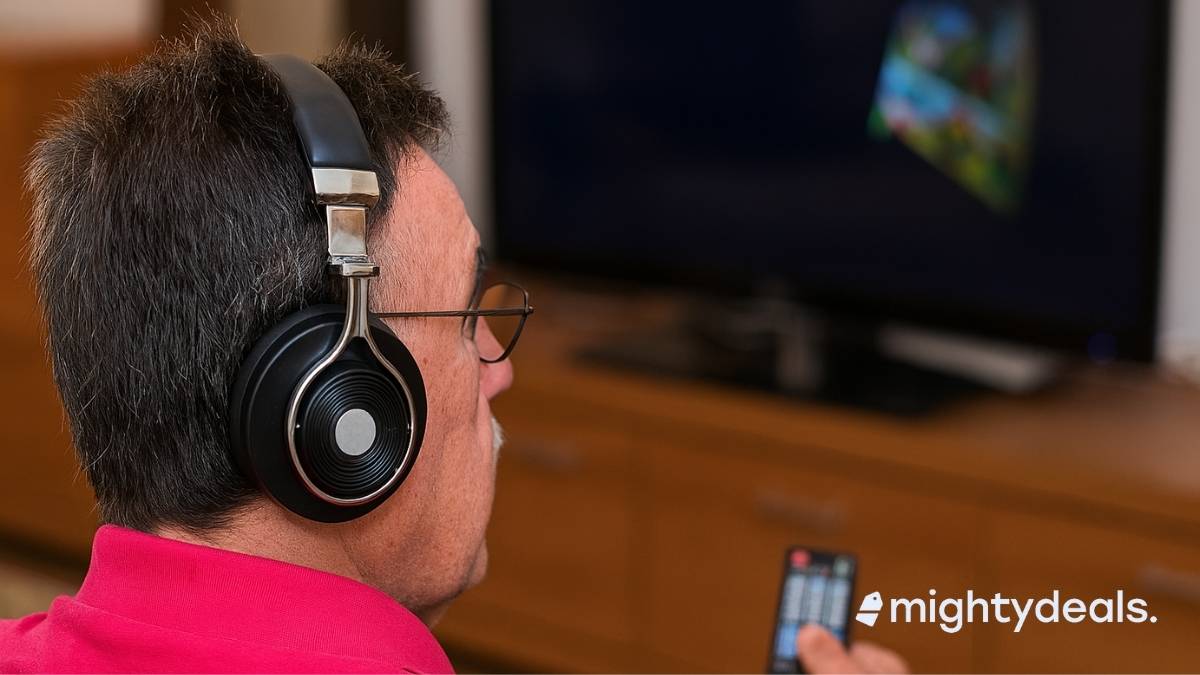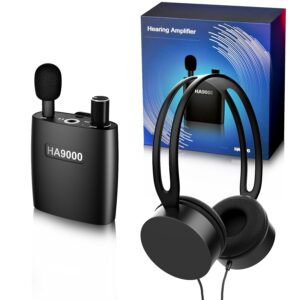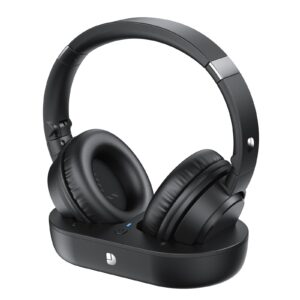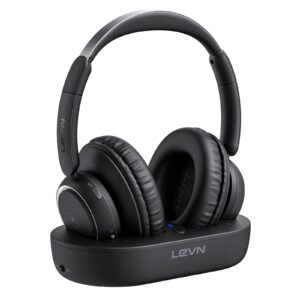We independently select all products and services. If you click through links we provide, Mighty Deals may earn a commission.
Headphones can make a huge difference for anyone who relies on hearing aids, especially when it comes to listening to music, podcasts, or even taking phone calls. The right pair can bring clarity and comfort that is hard to achieve with speakers or less suitable headphones. There are options made to work well with hearing aids, offering a more enjoyable listening experience.
Finding headphones that fit comfortably over or around hearing aids is not always easy. It’s important to think about design, as bulky or tight-fitting headphones might cause discomfort or even interfere with your hearing aids’ function. Sound quality, adjustability, and battery life can matter a lot, but they take a back seat if the headphones physically clash with your hearing aids or amplify unwanted noise.
The most critical things to pay attention to are fit, compatibility, and ease of use. Over-ear and on-ear models may press against hearing aids, while some in-ear or bone-conduction models are more suitable depending on your hearing aid style. It’s a good idea to look for headphones that are easy to adjust and don’t produce feedback when used with your devices. We spent hours researching and trying various headphones to find the models that work best for people who use hearing aids.
Best Headphones for Hearing Aids
We’ve selected some of the best headphones that work well with hearing aids. Our picks are comfortable, easy to use, and help you enjoy clear sound.
1. Apantimx HA9000 Sound Amplifier Headphones
For those of us who want simple, reliable headphones to use with hearing aids, the Apantimx HA9000 is a convenient choice, offering comfort and easy controls at an affordable price.
Pros
- Quick and simple volume adjustments with one tactile knob
- Lightweight and easy to wear for long periods
- Fast-charging and includes practical accessories for flexibility
Cons
- Limited to volume amplification without advanced sound tuning
- Ear cups may feel snug for those with larger ears
- Not a replacement for prescription hearing devices
We found setup refreshingly easy—all we needed was to take it out of the box, adjust the headphones to fit, and turn the single knob for power and volume. The controls couldn’t be more intuitive, making this especially practical for anyone who values simplicity. The included belt clip and lanyard really helped us move around with ease, and charging up the device took just about an hour.
Comfort stands out with the lightweight build, and we noticed it sits securely even when moving about the house. While it’s optimized for one-on-one chats or catching TV dialogue, sound is amplified clearly so we didn’t struggle to hear details. Just a heads up, there’s no way to fine-tune tone or pitch, so stronger background noises can still slip through at times.
It’s clear to us this isn’t meant to replace medical hearing aids, but as an assistive device alongside them, the Apantimx HA9000 Sound Amplifier Headphones make a noticeable difference for daily use. For anyone looking for practical, no-frills support, this model is worth a try.
2. Dytole Wireless TV Headphones
Anyone looking for reliable, comfortable headphones to use with hearing aids for TV and music will find these a strong option.
Pros
- Clear sound levels make dialogue and details stand out
- Large, soft ear cups fit over hearing aids without pinching
- Quick and easy docking system for charging
Cons
- On-ear controls can feel a bit fiddly
- Bass can be understated, especially in action scenes
- Bulkier than some on-ear designs
We found these Dytole headphones very comfortable during long TV sessions, even with hearing aids. The over-ear design leaves plenty of space, so hearing aids never get pressed uncomfortably, and the headband doesn’t squeeze. Our ears stayed cool, and adjusting the fit was easy.
The sound impressed us right away, especially when watching dialogue-heavy shows or listening to instrumental music. Voices came through clearly, and we could isolate the background noise far more easily than with typical TV speakers. Even walking to the fridge, the signal never cut out thanks to the long wireless range.
Charging could not be simpler. Just rest the headset on the dock and it starts recharging automatically. We used them throughout the day without running low on battery, which is rare with wireless models. While the bulkier build means you won’t forget you’re wearing them, the comfort and solid sound more than make up for it, especially for anyone who uses hearing aids regularly.
3. LEVN Wireless TV Headphones
These headphones are an easy choice for anyone needing clear TV sound without bothering others, especially if hearing aids are part of the setup.
Pros
- Simple plug-and-play setup makes connecting to the TV stress-free
- Soft ear cushions and adjustable fit stay comfortable for hours
- Long-lasting battery keeps us watching for days before needing a charge
Cons
- Charging base takes up some space near the TV
- Sound controls are only on the headphones, not on the base
- Ear cups fit loosely if we move around a lot
When we tried the LEVN Wireless TV Headphones, pairing was quick and didn’t require digging through menus. Plugging into the TV’s audio port and placing the headset on the charging base got us up and running right away. The wireless signal stayed strong across our living room, even behind a closed door.
We found the over-ear design works nicely with hearing aids because the cups are roomy and don’t press against the ears. Volume adjustments are simple and having independent controls lets everyone in the room keep their own preferred sound level. Even after hours of use, the padding kept us comfortable and we didn’t feel the urge to take them off.
The charging base is a bit big, so make some space for it near your TV. If you walk around a lot while wearing the headphones, the fit can loosen slightly. However, for mostly stationary TV viewing, they remain comfortable. All in all, we think LEVN Wireless TV Headphones are a reliable pick, especially for users looking for a straightforward and hassle-free option that works well with hearing aids.
Buying Guide
When we’re looking for headphones to use with hearing aids, comfort is important. We want to choose a pair with adjustable headbands and cushioned ear pads. This helps reduce pressure and makes longer listening sessions more enjoyable.
Compatibility is something we must think about. Some headphones work better with behind-the-ear (BTE) or in-the-ear (ITE) hearing aids. Larger ear cups often fit better over hearing aids and help avoid feedback.
Volume control is another feature to check. Easy-to-reach controls let us adjust sound without taking off our headphones or hearing aids.
We should also look for these features:
- Lightweight design
- Flexible fit
- Low feedback (whistling)
- Wireless or wired options
| Feature | Why It’s Important |
|---|---|
| Adjustable fit | Ensures comfort, avoids pressure on hearing aid |
| Large ear cups | Reduces feedback, fits over devices |
| Clear volume control | Simplifies use with hearing aids |
| Lightweight | Eases strain on ears for longer use |
If we choose wireless headphones, we need to check for a stable connection. Wired options often have fewer delays and can be more reliable with hearing aids.
Testing before buying helps us know the headphones feel comfortable and work well with our own hearing aids. It’s useful to try different types to see which combination fits best.
Frequently Asked Questions
We’ve gathered the most common questions people have when choosing headphones for use with hearing aids. Our answers focus on comfort, sound quality, and features that help users with hearing loss get the most out of their listening experience.
What features should I look for in headphones that are compatible with hearing aids?
We should look for headphones with soft, cushioned ear pads and adjustable headbands. Open-back or on-ear headphones can help reduce feedback. Wireless connectivity and a wide volume range are also useful.
How do amplifying headphones benefit individuals who are hard of hearing?
Amplifying headphones boost audio volume and can bring out clearer sound details. This helps us hear voices, music, and calls without extra background noise. Many models allow custom volume adjustments for each ear.
Can over-ear headphones be comfortably used by individuals wearing hearing aids?
Over-ear headphones with large, soft ear cups can fit gently around hearing aids. They help avoid pressure and keep the hearing aid in place. It’s important that the fit is loose enough to prevent feedback or discomfort.
Which headphones are recommended for people with severe hearing impairment?
Headphones with strong volume amplification and clear sound profiles are the most helpful for severe hearing loss. Some specialized models are designed for those of us with very limited hearing. Brands like Sennheiser and Sony offer high-volume options.
What are the best wireless earbuds options available for the hearing impaired?
Wireless earbuds that support Bluetooth and offer easy touch controls are a good option. Some brands, like Jabra and Apple, make models that fit well with many types of hearing aids. These earbuds often have settings to adjust the sound to our hearing preferences.
Are there any specific headphone models designed for seniors with hearing aids?
Several headphones are designed with simple controls and clear sound for seniors. Models from Bose and Sennheiser are known for their comfortable fit and easy-to-use buttons. Some even include built-in voice prompts and hearing aid compatibility features.




